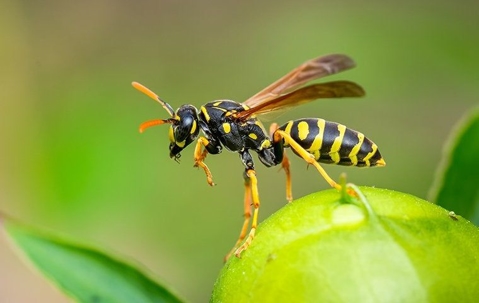Every year over 500,000 people are seen in the emergency rooms due to wasps and other stinging insect attacks. In Huntsville, wasps are a significant problem, with hundreds of homeowners seeking professional help to deal with these aggressive stinging insects every year.
There are hundreds of types of wasps in the world, with different habits and appearances, but all of them are predatory and aggressive, with a sting that's both painful and that may cause an allergic reaction.
In Alabama, you're likely to run into the following wasp types:
- Bold-faced hornet
- Black and yellow mud dauber
- Blue-winged wasp
- Cuckoo wasp
- Thread wasted wasp
- Great golden digger wasp
- Mutillid wasp
- Potter wasp
- Leucospid wasp
- Spider wasp
All wasps live in colonies, sometimes very large, with up to 4000 members. They are territorial and will sting if threatened. The big difference between being stung by a bee and a wasp is that wasps will sting you repeatedly, and the pheromones they lay on your skin as they sting will agitate other wasps in the vicinity to attack you as well.
Let's look at the basic habits and characteristics of the most common wasp, the yellow jacket, how to deter wasps from setting up camp on your property, how to get rid of wasps if they're already there, and if the DIY approach fails, how to find quality pest control in Huntsville.
What Are Wasps?
Yellow jacket wasps are stinging insects in Huntsville that are flying, communal insects and are very common across the United States. You can quickly identify them by their segmented body with a small waste and distinctive coloring. They are 3/8 to 5/8 of an inch long with a yellow and black face and striped abdomen. All wasps have six legs and a pair of antennae.
Yellow jacket wasps build nests in the ground or up in the air, stuck under a branch or a roof overhang. The nests are grayish-white in color and made of chewed-up cellulose.
Wasps are the most active in the middle of summer and are attracted to smells of food and overripe fruit. They feed on nectar, ripe fruit, and other insects.
The Dangers Wasps Can Cause On Your Property
While wasps are excellent pollinators, they are aggressive and territorial, unlike bees. If disturbed, they will sting, and wasp stings release a venom that, while not harmful to most people, is very painful. In people predisposed to allergies, venom from a wasp sting can easily cause severe, sometimes fatal allergic reactions.
Unlike bees and most other insects, wasps will not stop attacking simply because you've retreated but will keep on stinging while calling in additional reinforcements.
Factors That Attract Wasps To Your Yard
Wasp's primary food source is the nectar they gather from flowers, but they are also huge fans of overripe fruit and anything high in sugar. Walking through an orchard in the late summer, you'll see hundreds of wasps digging into over-ripe apples and plums.
A piece of pie left on the table, an open can of coke, or a sweet-smelling perfume will call to a wasp from over half a mile away. Wasps are also carnivores and will be very interested in any meat left outside.
How To Keep Wasps From Taking Over Your Property
If you're starting to see signs of wasps taking over your property, it's not the best idea to attempt to get them to relocate on your own. At EnviroGuard, we've got training and equipment to get them off your property without getting hurt in the process. If your backyard is a no-go zone thanks to wasps, don't risk your comfort and safety; give us a call today to learn more about our residential pest control services in Huntsville.

